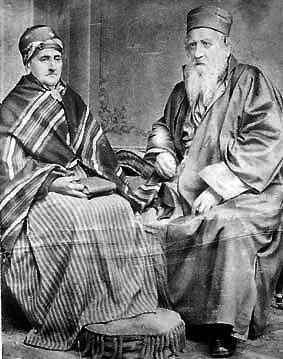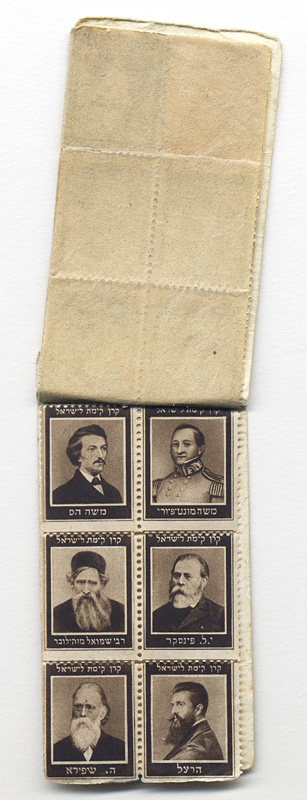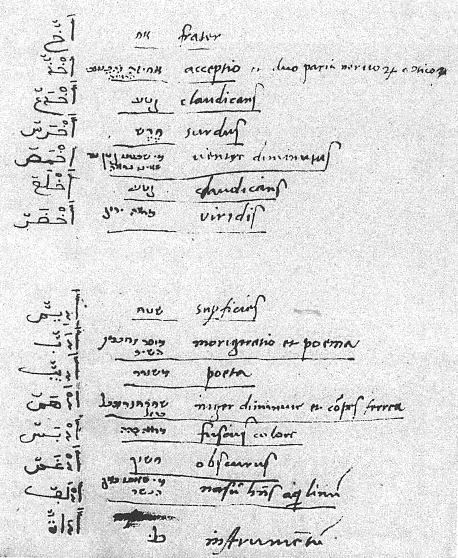|
Proto-Zionism
Proto-Zionism (or Forerunner of Zionism; , pronounced: ''Mevasrei ha-Tzionut'') is a concept in historiography describing Jewish thinkers active during the second half of the 19th century who were deeply affected by the idea of modern nationalism spreading in Europe at that time. They sought to establish a Jewish homeland in the Land of Israel. The central activity of these men took place between the years 1860 and 1874, before the establishment of practical Zionism (1881) and political Zionism (1896). It is for this reason that they are called precursors of Zionism or proto-Zionists. While the 17th century raised the overall idea, among Jews and non-Jews, of "restoring the Jews to Israel naturally by settlement and political action," the ultimate goal was not yet clearly defined. These ideas did not unite people to action and relied on the national project and the State (the Jewish nation). This group of men considered to be proto-Zionists includes Yehuda Bibas (1789–1852), ... [...More Info...] [...Related Items...] OR: [Wikipedia] [Google] [Baidu] |
Judah Alkalai
Judah ben Solomon Chai Alkalai (1798 – October 1878) was a Sephardic Jewish rabbi, and one of the influential precursors of modern Zionism along with the Prussian Rabbi Zvi Hirsch Kalischer. Although he was a Sephardic Jew, he played an important role in a process widely attributed to the Ashkenazi Jews. Alkalai became noted through his advocacy in favor of the restoration of the Jews to the Land of Israel. By reason of some of his projects, he may justly be regarded as one of the precursors of the modern Zionists such as Theodor Herzl. Biography Yehuda Alkalai was born in Sarajevo in 1798. At that time Bosnia and Herzegovina was under Ottoman Empire. He studied in Jerusalem, which also belonged to the Ottoman Turkish Empire, under different rabbis and came under the influence of the Kabbalah. In 1825 he became reader and teacher at the Sephardic community of Semlin, and then its rabbi a few years later. Semlin, today's Zemun district of the Serbian capital Belgrade, was at ... [...More Info...] [...Related Items...] OR: [Wikipedia] [Google] [Baidu] |
Moses Hess
Moses (Moritz) Hess (21 January 1812 – 6 April 1875) was a German-Jewish philosopher, early socialist and Zionist thinker. His theories led to disagreements with Karl Marx and Friedrich Engels. He is considered a pioneer of Labor Zionism. Biography Moses Hess was born in Bonn, which was under French rule at the time. In his French-language birth certificate, his name is given as "Moïse"; he was named after his maternal grandfather. His father was an ordained rabbi, but never practiced this profession. Hess received a Jewish religious education from his grandfather, and later studied philosophy at the University of Bonn, but never graduated. He married a poor Catholic seamstress, Sibylle Pesch, "in order to redress the injustice perpetrated by society". Although they remained happily married until Hess' death, Sibylle may have had an affair with Friedrich Engels while he was smuggling her from Belgium to France to be reunited with her husband. Sibylle, however, claimed the re ... [...More Info...] [...Related Items...] OR: [Wikipedia] [Google] [Baidu] |
Oriental Crisis Of 1840
The Oriental Crisis of 1840 was an episode in the Egyptian–Ottoman War in the eastern Mediterranean, triggered by the self-declared Khedive of Egypt and Sudan Muhammad Ali Pasha's aims to establish a personal empire in Ottoman Egypt. Background In the preceding decades, Muhammad Ali had expanded and strengthened his hold on Ottoman territory, beginning with Egypt, where he acted as a viceroy for the Sultan. Called upon to assist the Ottomans in the Greek War of Independence, Muhammad Ali in return demanded parts of Ottoman Syria to be transferred to his personal rule. When the war ended and the Porte failed to keep its promise, Muhammad Ali launched a military campaign against his Ottoman masters and easily took most of the Syrian lands. Syrian War In 1839, the Ottoman Empire attempted to retake Syria from Muhammad Ali but was defeated by his son, Ibrahim Pasha in the Battle of Nezib. Thus, a new war between Muhammad Ali and the Ottomans escalated, with the latter fai ... [...More Info...] [...Related Items...] OR: [Wikipedia] [Google] [Baidu] |
Sabbatai Zevi
Sabbatai Zevi (, August 1, 1626 – ) was an Ottoman Jewish mystic and ordained rabbi from Smyrna (now İzmir, Turkey). His family were Romaniote Jews from Patras. His two names, ''Shabbethay'' and ''Ṣebi'', mean Saturn and mountain gazelle, respectively. Active throughout the Ottoman Empire, Zevi claimed to be the long-awaited Jewish Messiah and founded the Sabbatean movement. Central to his teachings was the belief that during the Messianic Age, acts traditionally considered sinful would transform into righteous ones. This antinomian doctrine led Zevi and his followers to deliberately violate Jewish commandments, a controversial practice that later inspired movements like the Frankists. Upon arriving in Constantinople in February 1666, Sabbatai was imprisoned on the order of the grand vizier Köprülüzade Fazıl Ahmed Pasha. In September of that same year, after being moved from different prisons around the capital to the imperial courts' seat in Adrianople (now Edi ... [...More Info...] [...Related Items...] OR: [Wikipedia] [Google] [Baidu] |
Eliezer Ben-Yehuda
Eliezer Ben‑Yehuda (born Eliezer Yitzhak Perlman; 7 January 1858 – 16 December 1922) was a Russian–Jewish linguist, lexicographer, and journalist who immigrated to Jerusalem in 1881, when the Ottoman Empire ruled it. He is renowned as the lexicographer of the first Hebrew dictionary and also as the editor of Jerusalem-based '' HaZvi'', one of the first Hebrew newspapers published in the Land of Israel. Ben-Yehuda was the primary driving force behind the revival of the Hebrew language. Early life and education Eliezer Yitzhak Perlman (later Eliezer Ben-Yehuda) was born in Luzhki in the Vilna Governorate of the Russian Empire (now Vitebsk Oblast, Belarus) to Yehuda Leib and Tzipora Perlman, who were Chabad '' hasidim''. His native language was Yiddish. He attended a Jewish elementary school (a ''cheder'') where he studied Hebrew and the Hebrew Bible from the age of three, as was customary among the Jews of Eastern Europe. By the age of twelve, he had read large portions ... [...More Info...] [...Related Items...] OR: [Wikipedia] [Google] [Baidu] |
Adolphe Crémieux
Isaac-Jacob Adolphe Crémieux (; 30 April 1796 – 10 February 1880) was a French lawyer and politician who served as Minister of Justice under the Second Republic (1848) and Government of National Defense (1870–1871). Raised Jewish, he served as president of the Alliance Israélite Universelle (1863–67; 1868–80), secured French citizenship for Algerian Jews under French rule through the Crémieux Decree (1870), and was a staunch defender of the rights of the Jews of France.http://www.jpost.com/servlet/Satellite?cid=1220526714430&pagename=JPost/JPArticle/ShowFull/Cremieux Street: Champion of French Jewry. Biography He was born in Nîmes to a wealthy Papal Jew family, which had migrated from the papal enclave of Carpentras to Nîmes. He married a member of the Silny family in 1824. He and his wife are credited with raising their granddaughter, author and activist Louise Cruppi. Political career After the July Revolution of 1830 he came to Paris, formed connecti ... [...More Info...] [...Related Items...] OR: [Wikipedia] [Google] [Baidu] |
Nahum Sokolow
Nahum ben Joseph Samuel Sokolow ( ''Nachum ben Yosef Shmuel Soqolov'', ; 10 January 1859 – 17 May 1936) was a Jewish-Polish people, Polish writer, translator, and journalist, the fifth President of the World Zionist Organization, editor of ''Ha-Tsfira'', researcher, Zionist leader and statesman. Biography Sokolow was born in 1859 in the shtetl of Wyszogród near Płock in the Russian Empire (today in Poland) to a rabbinic family. His father, a descendant of Rabbi Nathan Nata Spira ("Megaleh Amukot"), moved to Płock in 1865. Sokolow studied in the study houses of Wyszogród, Płock, Lowicz, Sompolno, Koło, Kutno, and others. A polyglot, he studied foreign languages from a young age, becoming fluent in Russian, German, English, French, and Italian literature. His father wanted him to study for the rabbinate but with the intervention of Baron Wrangel, the governor of Płock, he enrolled in a secular school. He married at eighteen and settled in Makov, where his father-in-law ... [...More Info...] [...Related Items...] OR: [Wikipedia] [Google] [Baidu] |
Revival Of The Hebrew Language
The revival of the Hebrew language took place in Europe and the Levant region toward the end of the 19th century and into the 20th century, through which the language's usage changed from purely the sacred language of Judaism to a spoken and written language used for daily life among the Jews in Palestine, and later Israel. Eliezer Ben-Yehuda is often regarded as the "reviver of the Hebrew language" having been the first to raise the concept of reviving Hebrew and initiating a project known as the Ben-Yehuda Dictionary. The revitalization of Hebrew was then ultimately brought about by its usage in Jewish settlement in Ottoman Palestine that arrived in the waves of migration known as the First Aliyah and the Second Aliyah. In Mandatory Palestine, Modern Hebrew became one of three official languages and after the Israeli Declaration of Independence in 1948, one of two official languages of Israel, along with Modern Arabic. In July 2018, a new law made Hebrew the sole national ... [...More Info...] [...Related Items...] OR: [Wikipedia] [Google] [Baidu] |
Judah HeHasid (Jerusalem)
:''See Judah he-Hasid (other) for other people who used this name.'' Judah he-Hasid Segal ha-Levi (; c. 1660 in Siedlce – 19 October 1700 in Jerusalem, Ottoman Syria) was a Jewish preacher who led the largest organized group of Jewish immigrants to the Land of Israel in the 17th and 18th centuries. Departure from Europe Judah travelled from one Jewish community to another throughout Poland, urging repentance, asceticism, physical mortifications, and calling for ''aliyah''. In 1697, he and 31 families of his followers left for Moravia and made a stop at Nikolsburg. Judah spent a year traveling throughout Germany and Moravia gaining followers. Many joined the group, influenced by his fervor. By the time the whole group gathered in Italy, they numbered about 1,500. Almost a third of the pilgrims died of hardships and illnesses during the trip. On the way, they contracted debts, and in exchange for permission to enter the Ottoman Empire they were forced to give the ... [...More Info...] [...Related Items...] OR: [Wikipedia] [Google] [Baidu] |
Aliyah
''Aliyah'' (, ; ''ʿălīyyā'', ) is the immigration of Jews from Jewish diaspora, the diaspora to, historically, the geographical Land of Israel or the Palestine (region), Palestine region, which is today chiefly represented by the Israel, State of Israel. Traditionally described as "the act of going up" (towards the Jerusalem in Judaism, Jewish holy city of Jerusalem), moving to the Land of Israel or "making aliyah" is one of the most basic tenets of Zionism. The opposite action – emigration by Jews from the Land of Israel – is referred to in the Hebrew language as ''yerida'' (). The Law of Return that was passed by the Knesset, Israeli parliament in 1950 gives all diaspora Jews, as well as their children and grandchildren, the right to relocate to Israel and acquire Israeli citizenship on the basis of connecting to their Jewish identity. For much of Jewish history, their history, most Jews have lived in the diaspora outside of the Land of Israel due to Jewish militar ... [...More Info...] [...Related Items...] OR: [Wikipedia] [Google] [Baidu] |
Ben-Zion Dinur
Ben-Zion Dinur (; January 1884 – 8 July 1973) was a Ukrainian-born Israeli historian, educator, and politician. He held the position of professor of Jewish history at the Hebrew University of Jerusalem and represented Mapai in the first Knesset, serving as Minister of Education. Dinur was one of the founders of Yad Vashem and a member of the Israel Academy of Sciences. The Dinur Center for Research in Jewish History was named in his honor. Biography Ben-Zion Dinaburg (later Dinur) was born in Khorol in the Russian Empire (now Poltava Oblast, Ukraine). He received his education in Lithuanian yeshivot. He studied under Shimon Shkop in the Telz Yeshiva, and became interested in the Haskalah through Rosh Yeshiva Eliezer Gordon's polemics. In 1898 he moved to the Slabodka yeshiva and in 1900 he traveled to Vilnius and was certified a Rabbi. He then went to Lyubavichi to witness the Chabad-Lubavitch branch of Hasidic Judaism. Between 1902 and 1911 he was engaged in Z ... [...More Info...] [...Related Items...] OR: [Wikipedia] [Google] [Baidu] |
Judah HaLevi
Judah haLevi (also Yehuda Halevi or ha-Levi; ; ; c. 1075 – 1141) was a Sephardic Jewish poet, physician and philosopher. Halevi is considered one of the greatest Hebrew poets and is celebrated for his secular and religious poems, many of which appear in present-day liturgy. Judah haLevi was born in Tudela, in the region of Navarre, then part of Muslim Spain. Although little is known about his early life or education, it is clear that he was well-versed in Arabic, Hebrew, and classical sciences including medicine and philosophy. In his youth, he began composing Hebrew poetry, and his reputation eventually reached Moses ibn Ezra in Granada. After initial difficulties in traveling due to political shifts, haLevi was able to establish literary connections across major Jewish centers in al-Andalus. HaLevi's poetic corpus includes a wide array of genres, including panegyrics, friendship poems, wine songs, riddles, didactic verse, and wedding poems. However, he is best remembered ... [...More Info...] [...Related Items...] OR: [Wikipedia] [Google] [Baidu] |





